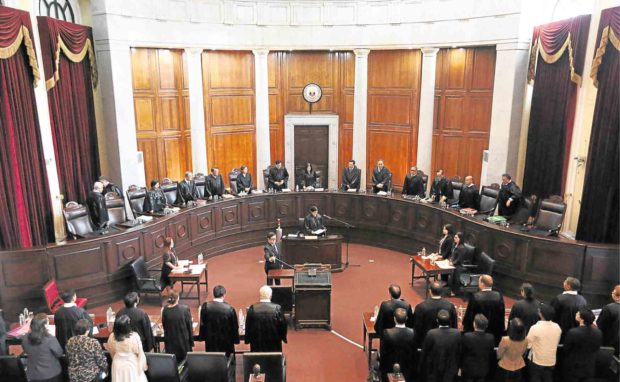
Supreme Court justices, shown in this June 13, 2017 photo, have voted to affirm the martial declaration of President Rodrigo Duterte over the whole of Mindanao. INQUIRER FILE / MARIANNE BERMUDEZ
The Constitution gives the President the authority to place any part or the entire Philippines under martial law, the Supreme Court said in its decision declaring as valid Proclamation 216 or President Rodrigo Duterte’s martial law proclamation in Mindanao.
“There is no constitutional edict that martial law should be confined only in the particular place where the armed public uprising actually transpired. This is not only practical but also logical,” the Supreme Court said in its 82-page decision written by Associate Justice Mariano Del Castillo.
“Martial law is an urgent measure since at stake is the nation’s territorial sovereignty and survival,” the high court added.
READ: SC ruling: Duterte has discretion to place entire PH under martial law
Ten other justices concurred in the decision including Associate Justices Presbitero Velasco Jr., Teresita Leonardo – De Castro, Diosdado Peralta, Lucas Bersamin, Jose Mendoza, Bienvenido Reyes, Estela Perlas-Bernabe, Francis Jardeleza, Samuel Martires and Noel Tijam – and all submitted their concurring opinions.
The high court pointed out that the President need not wait for the armed conflict in Marawi to spread to other areas in Mindanao.
“The President has to respond quickly… The President’s duty to maintain peace and public safety is not limited only to the place where there is actual rebellion; it extends to other areas where the present hostilities are in danger of spilling over,” the high court added.
“Clearly, the power to determine the scope of territorial application belongs to the President,” the high court said.
The high court said while its duty was to determine the sufficiency of factual basis in the declaration of martial law, it only has to rely on the same information given to the President.
It pointed out that it has no capacity to verify every intelligence data which has become the basis for the proclamation.
”The Court found that there was sufficient factual basis for the declaration of martial law and the suspension of the privilege of the writ of habeas corpus over the whole of Mindanao,” read the decision which was released in line with the 30-day deadline for the SC to resolve the petitions filed last June 5.
”The entirety of Proclamation No. 216 and the Report submitted to Congress suffice to show that there was an armed public uprising, the culpable purpose of which was to remove from the allegiance of the Philippine Government a portion of its territory and to deprive the Chief Executive of any of his powers and prerogatives. This led the President to believe that there was probable cause for the crime of rebellion and that public safety required the imposition of martial law and the suspension of the privilege of the writ of habeas corpus,” it added.
Petitioners said that there were information used as basis in the proclamation which, upon verification did not actually happen.
But the high court pointed out that they should also not expect absolute correctness of the facts stated in the proclamation and in the President’s Written Report as the President cannot be expected to verify the accuracy and veracity of all facts reported to him due to the urgency of the situation. To require precision in the President’s appreciation of facts would unduly burden him and therefore impede the process of decision making.
The Court noted that the sufficiency of the factual basis should not be affected if subsequent events show that the situation had not been accurately reported to the President since the Court’s review is limited to sufficiency, not accuracy, of the factual basis.
Three justices voted to partially grant the petitions: Chief Justice Ma. Lourdes Sereno, Senior Associate Justice Antonio Carpio and Associate Justice Alfredo Benjamin Caguioa. They believed that while there was factual basis for declaration of martial law, it should be limited in scope and should have not covered entire Mindanao.
In her 51-page dissenting opinion, Sereno said martial law should only cover the provinces of Lanao del Sur, Maguindanao and Sulu.
She disagreed with the majority opinion that the discretion on the coverage of the martial law should be left to the President as it is an executive duty.
“Martial law is an extraordinary measure necessitating the exercise of extraordinary power. Nevertheless, the President, in the exercise of his commander-in-chief powers, does not have unbridled discretion as to when, where and how martial law is to be declared,” Sereno explained.
Only Associate Justice Marvic Leonen voted to grant the petitions and declare the proclamation as invalid for lack of factual basis.
Leonen believed that the government failed to justify the necessity for declaration of martial law and why other powers of the President – including the power to call out the military – would not suffice to address the problem in Mindanao.
He said the respondents represented by Calida “failed to show what additional legal powers will be added by martial law except perhaps to potentially put on the shoulders of the Armed Forces of the Philippines the responsibilities and burdens of the entire civilian government over the entire Mindanao region.”
Leonen said the situation in Mindanao involves only “acts of terrorism which should be addresses in a decisive but more precise manner.”
“Never again should this Court allow itself to step aside when the powerful invoke vague powers that feed on fear but could potentially undermine our most cherished rights. Never again should we fall victim to a false narrative that a vague declaration of martial law is good for us no matter the circumstances. We have the courage to never again clothe authoritarianism in any disguise with the mantle of constitutionality,” read his 92-page dissenting opinion. CBB